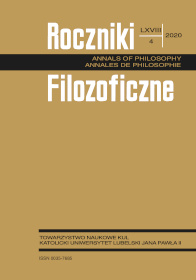Non-Classical Probabilities for Decision Making in Situations of Uncertainty
Abstrakt
Nieklasyczne prawdopodobieństwa na potrzeby podejmowania decyzji w sytuacjach niepewności
Analiza sytuacji, w których informacja jest częściowa, niepełna bądź niespójna wskazuje na potrzebę zbudowania jakościowych miar siły przekonań odmiennych niż te, które są oferowane przez klasyczną teorię prawdopodobieństwa. W niniejszej pracy porównujemy dwa ujęcia zaproponowane dla realizacji tej potrzeby: teorię Dempstera-Shafera i niestandardową teorię prawdopodobieństwa nabudowaną na logice Belnapa-Dunna. Pokazujemy, że te dwa formalizmy przyjmują ortogonalne perspektywy postrzegania niedostatków informacyjnych, a jednocześnie dostarczają rezultatów częściowo ze sobą korespondujących. Na koniec porównujemy różne dynamiczne reguły z obu formalizmów traktując je wszystkie jako uogólnienie warunkowania Bayesowskiego.
Bibliografia
Alchourrón, Carlos E., Peter Gärdenfors, and David Makinson. 1985. “On the Logic of Theory Change: Partial Meet Contraction and Revision Functions.” Journal of Symbolic Logic 50, No. 2: 510–530.
Anderson, Alan Ross, and Nuel D. Belnap. 1975. Entailment: The Logic of Relevance and Necessity. Princeton, NJ: Princeton University Press.
Baltag, Alexandru, Bryan Renne, and Sonja Smets. 2014. “The Logic of Justified Belief, Explicit Knowledge, and Conclusive Evidence. Annals of Pure and Applied Logic 165, issue 1: 49–81.
Baltag, Alexandru, Lawrence S. Moss, and Sławomir Solecki (1998). “The Logic of Common Knowledge, Public Announcements and Private Suspicions. In Proceedings of the 7th Conference on Theoretical Aspects of Rationality and Knowledge (TARK 98), edited by Itzhak Gilboa, 43–56. San Francisco, CA: Morgan Kaufmann Publishers.
Batens, Diderik. 2001). “A General Characterization of Adaptive Logics.” Logique et Analyse 44, No. 173-175: 45–68.
Belnap, Nuel D. 1977. “A Useful Four-Valued Logic.” Modern Uses of Multiple-Valued Logic: invited papers from the Fifth International Symposium on Multiple-Valued Logic, held at Indiana University, Bloomington, Indiana, May 13-16, 1975, edited by J. Michael Dunn and George Epstein, 5–37. Dordrecht, Boston: D. Reidel.
Belnap, Nuel D. 2019. “How a Computer Should Think.” In New Essays on BelnapDunn Logic, edited by Hitoshi Omori and Heinrich Wansing, 35–53. Springer International Publishing.
van Benthem, Joahan, Jan van Eijck, and Barteld Kooi. 2006. “Logics of Communication and Changet.” Information and Vomputation 204, No. 11: 1620–1662.
van Benthem, Johan. 2011. Logical Dynamics of Information and Interaction. Cambridge, MA: Cambridge University Press
Bush, Robert R. and Frederick Mosteller. 1955. Stochastic Models for Learning. Hoboken, NJ: Wiley.
Childers, Timothy, Ondrej Majer, and Peter Milne. 2019. The (Relevant) Logic of Scientific Discovery (under review).
da Costa, Newton C.A. 1974. “On the Theory of Inconsistent Formal Systems.” Notre Dame Journal of Formal Logic 15, No. 4: 497–510.
da Costa, Newton C.A., and V. Subrahmanian. 1989. “Paraconsistent Logic as a Formalism for Reasoning about Inconsistent Knowledge Bases.” Artificial Intelligence in Medicine 1, issue 4: 167–174. DOI: https://doi.org/10.1016/0933-3657(89)90031-6.
Darwiche, Adnan, and Judea Pearl. 1997. “On the Logic of Iterated Belief Revision.” Artificial Intelligence 89, issue 1–2: 1–29. doi: 10.1016/S0004-3702(96)00038-0.
Dempster, Arthur P. 1967. “Upper and Lower Probabilities Induced by a Multivalued Mapping.” The Annals of Mathematical Statistics 38, No. 2, 325–339.
van Ditmarsch, Hans, Wiebe van der Hoek, Barteld Kooi. 2008. “Dynamic Epistemic Logic.” Synthese 337.
Dunn, J. Michael, and Nicholas M. Kiefer. 2019. “Contradictory Information: Better than Nothing? The Paradox of the Two Firefighters.” In Graham Priest on Dialetheism and Paraconsistency, edited by Can Başkent, and Thomas Macaulay Ferguson, 231–247. Springer International Publishing.
Dunn, J. Michael. 1976. “Intuitive Semantics for First Degree Entailment and ‘Coupled Trees’.” Philosophicl Studies 29, No. 3: 149–168.
Dunn, J. Michael. 2010). Contradictory Information: Too Much of a Good Thing. Journal of Philosophical Logic 39(4), 425–452.
Erev, Ido, and Alvin E. Roth. 1998. “Predicting How People Play Games: Reinforcement Learning in Experimental Games with Unique, Mixed Strategy Equilibria.” American Economic Review 88, No. 4: 848–881.
Fagin, Ronald, and Joseph Y. Halpern. 1990. “A New Approach to Updating Beliefs.” In UAI ’90: Proceedings of the Sixth Annual Conference on Uncertainty in Artificial Intelligence edited by Piero P. Bonissone, Max Henrion, Laveen N. Kanal, John F. Lemmer, 347–374. Elsevier.
Fagin, Ronald, and Joseph Y. Halpern. 1991. “Uncertainty, Belief, and Probability.” Computational Intelligence 7, No. 3: 160–173.
Fagin, Ronald, Joseph Y. Halpern, and Nimrod Megiddo. 1990. “A Logic for Reasoning about Probabilities.” Information and Computation 87, issue 1–2: 78–128. doi: 10.1016/0890-5401(90)90060-U.
Halpern, Joseph Y. 2017. Reasoning about Uncertainty. Cambridge, MA: MIT Press.
Jaśkowski, Stanisław. 1969. “Propositional Calculus for Contradictory Deductive Systems.” Studia Logica 24: 143–157
Jøsang, Audun. 1997. “Artificial Reasoning with Subjective Logic.” In Proceedings of the Second Australian Workshop on commonsense Reasoning, 48: 34.
Katsuno, Hirofumi, and Alberto O. Mendelzon. 1991. “Propositional Knowledge Base Revision and Minimal Change.” Artificial Intelligence 52, No. 3: 263–294.
Klein, Dominik, Johanes Marx, and Simon Scheller. 2018. “Rationality in context: On Inequality and the Epistemic Problems of Maximizing Expected Utility.” Synthese. doi: 10.1007/s11229-018-1773-0.
Klein, Dominik, Ondrej Majer, and Sourush Rafiee Rad. 2020. “Probabilities with Gaps and Gluts” arXiv:2003.07408.
Kolmogorov, A.N. 2018. Foundations of the theory of probability. Courier Dover Publications.
Kooi, Bartel P. 2003. “Probabilistic Dynamic Epistemic Logic.” Journal of Logic, Language and Information 12: 381–408
Leitgeb, Hannes, and Krister Segerberg. 2007, “Dynamic Doxastic Logic: Why, How, and Where To?.” Synthese, 155: 167–190.
Paris, J.B. 1994. The Uncertain Reasoners’ Companion: A Mathematical Perspective. (Cambridge Tracts in Theoretical Computer Science, Series Number 39). Cambridge, MA: Cambridge University Press.
Priest, Graham. 1979. “Logic of Paradox.” Journal of Philosophical Logic 8: 219–241.
Priest, Graham. 2006. In contradiction. Oxford: Oxford University Press.
Priest, Graham. 2007. “Paraconsistency and dialetheism.” Handbook of the History of Logic 8: 129–204.
Rescher, Nicholas, and Ruth Manor. 1970. “Propositional Calculus for Contradictory Deductive Systems.” Theory and Decision 1, No. 2: 179–217.
Shafer, Glenn. 1976. A Mathematical Theory of Evidence. Vol. 42. Princeton, NJ: Princeton University Press.
Sprenger, Jan, and Stephan Hartmann. 2019. Bayesian Philosophy of Science. Oxford: Oxford University Press.
Zhou, Chunlai. 2013). “Belief Functions on Distributive Lattices.” Artificial Intelligence 201: 1–31.
Copyright (c) 2020 Roczniki Filozoficzne

Utwór dostępny jest na licencji Creative Commons Uznanie autorstwa – Użycie niekomercyjne – Bez utworów zależnych 4.0 Międzynarodowe.





